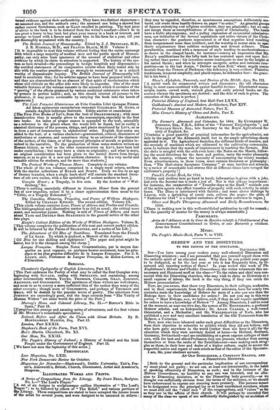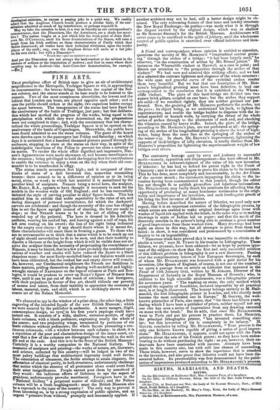HEBREW AND THE DISSENTERS.
TO THE EDITOR OF THE SPECTATOR. 31st October 1843.
Sees—You have among your readers many well-educated Dissenters and Dissenting ministers ; and I am persuaded that you yourself regard them with the catholic spirit of an educated man. Why then do you permit your parer to be disfigured, as for the last year or two it has frequently been, by ill- natured and taunting notices of them ? In your review this week of The Englishman's Hebrew and Chaldee Concordance, the writer volunteers this un- necessary and illnatured scoff at the close—" To the rulers and chief men con- nected with the Dissenting churches, who may wish to shine as Hebraists at a small expense of labour, the book is the very thing, if they can catch the Hebrew pronunciation." Now, are you aware, that these very Dissenters, in their colleges, academies, and in their requirements from their educated ministers, have for nearly two centuries made the knowledge of Hebrew far more of a sine qua non than the Bishops have in their candidates for orders ? Do not you say in this very notice, " Most Bishops, now, we believe, wish, if they do not require candidates for orders to have a knowledge of Hebrew"? Among Dissenters, I call to mind at the moment, as near our own day, the names of Dr. BooTintore, a profound Hebrew scholar, and an Independent ; Dr. ADAM CLARKE, a well-versed Orientalist, and a Methodist ; and Mr. WELLBELOVED of York, who has published a new and very excellent translation of the Old Testament from the Hebrew, a Unitarian.
Now, men who have laboured under such great difficulties as the Dissenters, from their objection to subscribe to articles which they did not believe, and who have gone anywhere in the world (rather than not have it all) for the education which they were unwisely denied at home—to Holland, Scotland, Germany, Switzerland—and are establishing at a great expense colleges of their own, with the best and ablestProfessors they can procure, whether from among themselves or from the ranks of the Establishment—men making such strug- gles as these, in their love and desire of a higher culture, ought to secure the respectful notice and regard of such minds as that of the editor of the Spectator.
I am, Sir, your obedient servant, AN OLD SUBSCRIBER, A CONSTANT READER., AND A. DISSENTING MINISTER.
[Both to the general and the particular implication of our correspondent we must plead not guilty : we are not, at least not intentionally, in the habit of speaking offensively of Dissenters, as such ; and in the instance of the Hebrew Concordance, no hostility to any one was intended, and no allu- sion to Dissenting ministers, or to the Dissenting body generally,—as we thought was sufficiently obvious from the terms of the sentence, or we should have endeavoured to express our meaning more precisely. The persons meant to be designated were the principal lay or at least unordained members, whom we must still call the "chief men" of the congregations, and "rulers " as far as they can in the Affairs of their church. It will perhaps be conceded that many of the clam we speak of are sufficiently distinguished by an ambition Of
theological criticism, to excuse a passing joke in a quiet way. We readily admit that the Anglican Church would produce a similar body, if its con- stitution admitted so much of layinterference, or perhaps required it. May we take the occasion to hint, in a way as friendly as our correspondent's remonstrance, that the Dissenters, like the Americans, are a shade too sensi- tive ? The nation laughs at a jest which hits the weak point of John Bull; even Mr. O'CONNELL, amid his fierce denunciations of the Saxon, will raise a laugh from his Irish auditors on those characteristics of Paddy which that Saxon discovered; all trades have their technical witticisms upon the tender places of the craft ; nay, even the Anglican divine will smile at a fair joke on his own cloth: but with a Dissenter— Touch me—and no minister so sore."
god yet the Dissenters are not always the backwardest or the mildest in the censure of actions or the imputation of motives ; and that in eases where their vocation may be doubted—the Anti-Corn-law demonstration, for example.
—En.]



























 Previous page
Previous page